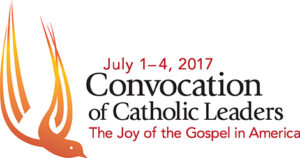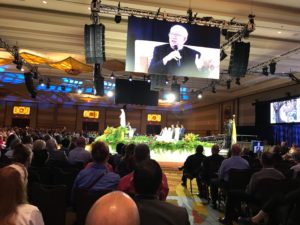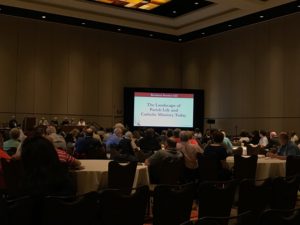 There is no doubt that the US Catholic Church is in the midst of a radical transformation. It is not enough to sit back, and just keep maintaining the church we have. We must be missionary in our nature, a permanent state of outwardly living our joyous faith. That is the state in which the Convocation of Catholic Leaders have provided this background:
There is no doubt that the US Catholic Church is in the midst of a radical transformation. It is not enough to sit back, and just keep maintaining the church we have. We must be missionary in our nature, a permanent state of outwardly living our joyous faith. That is the state in which the Convocation of Catholic Leaders have provided this background:
Jesus’ call to missionary discipleship has been sustained in and answered by his Church over the centuries. Following the Second Vatican Council, Bl. Paul VI issued a call for the whole Church to embrace anew her fundamental mission of evangelization. St. John Paul II amplified and deepened this call with an emphasis on the need to undertake a new evangelization, an emphasis continued and strengthened by Pope Benedict XVI and now Pope Francis.
In Evangelii Gaudium, Pope Francis encouraged the Church to enter a “new phase of evangelization” as missionary disciples—a phase marked by ongoing “missionary conversion.” This is the motivation and context for the Convocation of Catholic Leaders: The Joy of the Gospel in America. The Holy Father teaches that, “The Gospel joy which enlivens the community of disciples is a missionary joy” (EG, no. 21). Each of us is called to witness Christ to the world. At the Convocation, bishops and other Catholic leaders will “devote the necessary effort to advancing along the path of a pastoral and missionary conversion which cannot leave things as they presently are.”
The pastoral and missionary conversion called for by Pope Francis includes an initiation into the “‘art of accompaniment’ which teaches us to remove our sandals before the sacred ground of the other (cf. Ex 3:5).” This accompaniment, as the Holy Father explains, leads others closer to God as “a pilgrimage with Christ to the Father.” Missionary discipleship demands “drawing nearer to others,” including drawing “near to new forms of poverty and vulnerability, in which we are called to recognize the suffering Christ.” Pope Francis’s vision of missionary conversion and pastoral accompaniment is central to the Convocation.
 We started today with prayers for the opening of our minds, hearts, and souls for the message and mission of the Convocation. Archbishop Wenski, the only Bishop in Florida who is native to the state (and he reminded us of that fact), opened the day with a wonderful introduction to the current landscape of both the US Church and the overall society of the nation. He clearly illustrated Pope Francis’ focus of the Church as a Field Hospital is the core structure that must be put in place. A keynote from Boston College professor Dr. Ospino, who spoke about the constantly changing environment of the Catholic Church in the US. It has actually been constant historically, we just so happen to be at a moment of significant change. The new wave of immigrants from all different cultures is impacting all parishes in some way. He stated that 60% of Catholics in the US under 18 are Latino. If we do not connect people in their communal life both to their faith and to the parish life, they will not prioritize their faith, allowing for the “disconnection” of religion, makes caring about others someone else’s problem.
We started today with prayers for the opening of our minds, hearts, and souls for the message and mission of the Convocation. Archbishop Wenski, the only Bishop in Florida who is native to the state (and he reminded us of that fact), opened the day with a wonderful introduction to the current landscape of both the US Church and the overall society of the nation. He clearly illustrated Pope Francis’ focus of the Church as a Field Hospital is the core structure that must be put in place. A keynote from Boston College professor Dr. Ospino, who spoke about the constantly changing environment of the Catholic Church in the US. It has actually been constant historically, we just so happen to be at a moment of significant change. The new wave of immigrants from all different cultures is impacting all parishes in some way. He stated that 60% of Catholics in the US under 18 are Latino. If we do not connect people in their communal life both to their faith and to the parish life, they will not prioritize their faith, allowing for the “disconnection” of religion, makes caring about others someone else’s problem.
The panel discussion provided a great representation of the landscape of the US Catholic Church, and all the challenges we all face together. The most important word was “together”. Not just accepting diversity, but welcoming in and allowing that diversity (culture, race, age, sex, ideas, and all the forms of diversity) to challenge and change the parish. From a Bronx priest to a Georgetown CARA researcher, all the message was the same: showing the joy of the Catholic Church through reaching the peripheries. Youth, young adults, immigrants, nones, working poor, and countless others that do not feel welcome or engaged in the church. How do we reach them with the true message that Jesus loves them for who they because God made them in love.
 Breakout sessions followed, discussing the nones, people who no longer identify themselves as religious or part of a religious organization, as well as what is working (and not) in the current environment of parishes and ministry today. What tremendous discussions.
Breakout sessions followed, discussing the nones, people who no longer identify themselves as religious or part of a religious organization, as well as what is working (and not) in the current environment of parishes and ministry today. What tremendous discussions.
The afternoon session was called the Radical Call to Missionary Discipleship. There are several major words in that title. The panel defined “radical” as the uncompromising desire to go out and get to the heart of the matter, the root of the life we are accompanying. Bishop Caggiano of Bridgeport, who clearly communicated his Italian roots, said our whole role in the world is to create an invitation to our homes, and like any good host, we should clean our house, makes sure there is enough food for everyone, and ensure that everyone who comes feels like family. What a great analogy for our Parish Family.
Cardinal Wuerl of Washington DC provided the definition of a Missionary Disciple. He provided 5 key characteristics:
- Boldness/Courage
- Connection to the Church
- Sense of Urgency
- Compassion/Mercy
- Joy
Can we all see those characteristics in ourselves, our ministries, and our daily efforts in the world? That is the plan of the Catholic Church in the United States.
